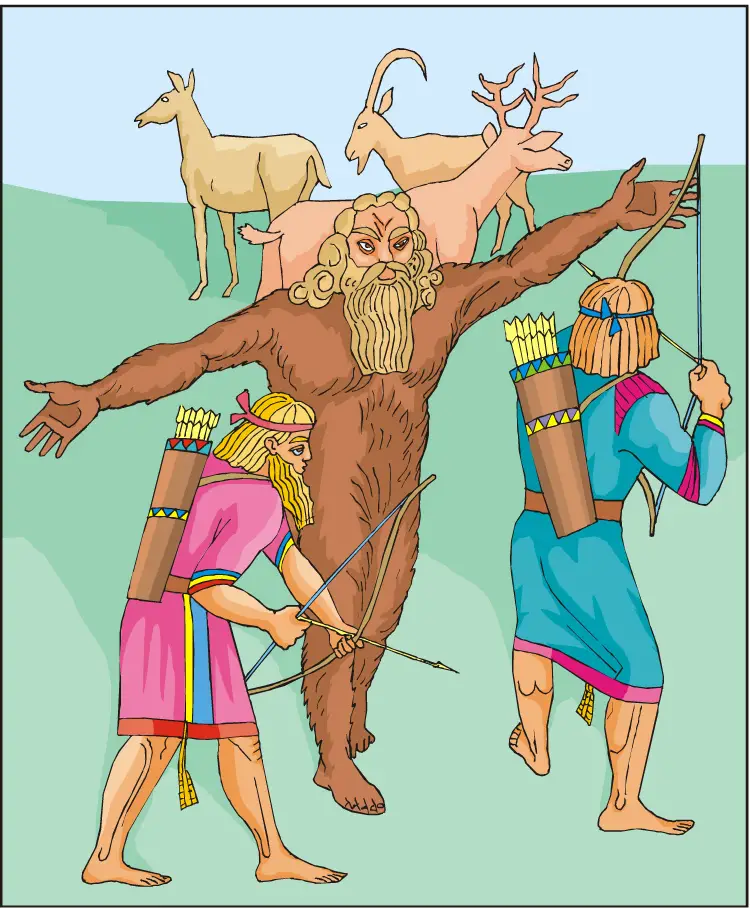Epic of Gilgamesh
What is it and who wrote it?
- The Epic of Gilgamesh is the oldest example of epic literature. The story was told in an oral form before people started to write it down. The tale was told throughout Mesopotamia, especially in Sumer and Babylonia.
- The version that is most complete was written by a Babylonian writer and priest, Shin-Leqi-Unninni, probably between 1300-1000 BC.
- Gilgamesh is believed to have been based on a king from the city of Uruk. There is evidence to show us that he was a real person, including writings that show that he built the famous walls around the city of Uruk. Other kings, who existed at the same time as Gilgamesh, also mention his name.


The story
- In the first half of the story, we are introduced to the main character Gilgamesh the King of Uruk who is two-thirds god and one-third human. The gods have made Gilgamesh strong, brave and beautiful.Yet, Gilgamesh has taken his abilities and looks and used them to abuse his position of power much to the anger of ordinary people in Uruk.
- The Akkadian goddess Aruru decides to tame the arrogant Gilgamesh. She creates an incredibly strong wild-man called Enkidu to get Gilgamesh under control. Enkidu soon becomes more like a man and challenges Gilgamesh. Enkidu disapproves of Gilgamesh’s unfaithfulness and his poor treatment of women.
- Uruk and Enkidu begin as enemies and engage in a huge battle with one another. Gilgamesh starts to win the fight but spares Enkidu and realises that he must learn from him. The story then becomes a journey between two close friends. They soon become inseparable and Gilgamesh learns that he has much in common with Enkidu.
- Many years later, Gilgamesh is bored with his life in Uruk. He seeks another adventure that will make him into a true hero. He decides to go to the sacred Cedar Forest to challenge and kill the demon and protector of the forest Humbaba. Gilgamesh and his friend Enkidu kill the demon, but it puts a curse on them.
- The goddess Ishtar later sends the Bull of heaven to punish Gilgamesh for rejecting her, but he and Enkidu kill the beast. The gods are furious and they sentence Enkidu to death as a form of punishment.
- In the second part of the story, Gilgamesh is devastated about his friend’s death. He starts a long, dangerous journey to try to find the secret of eternal life. Eventually, he meets Utnapishtim who tells him the story of how god wanted to destroy people in a great flood for the chaos they had brought to the world.
- Utnapishtim offers Gilgamesh the eternal life that he wishes for on the condition that he stays awake for six days and seven nights. Gilgamesh falls asleep immediately and, having failed, Utnapishtim sends him back to Uruk to live his life.
- On his way back home, Gilgamesh is given another chance at finding eternal life, but again he fails to achieve it. He goes back to Uruk and lives the life of a normal mortal until his eventual death. The people of Uruk mourn his passing.

Influence
- The stories and themes from the Epic of Gilgamesh have reappeared in different forms in other literary or historical works.
- Perhaps the most famous story to reappear is the tale of the great flood. In the Epic the gods plan to destroy the world as punishment for man’s wrongdoings. In the original, Utnapishtim builds a large boat to save his family and several animals. This is very similar to the story of Noah’s ark featured in the bible.
- The stories in Gilgamesh may have inspired the later tales of Greek civilisation too. The Greek epics are full of tales of angry gods and goddesses, monsters and giants all ready to wreak havoc.

The search for lost tablets
- Recently, a history museum in Iraq obtained a series of lost clay tablets. One of these tablets was a missing part of the Babylonian version of the Tale of Gilgamesh. The new tablet includes 20 new lines from the poem describing the Cedar Forest in the tale where Gilgamesh overcomes Humbada.



